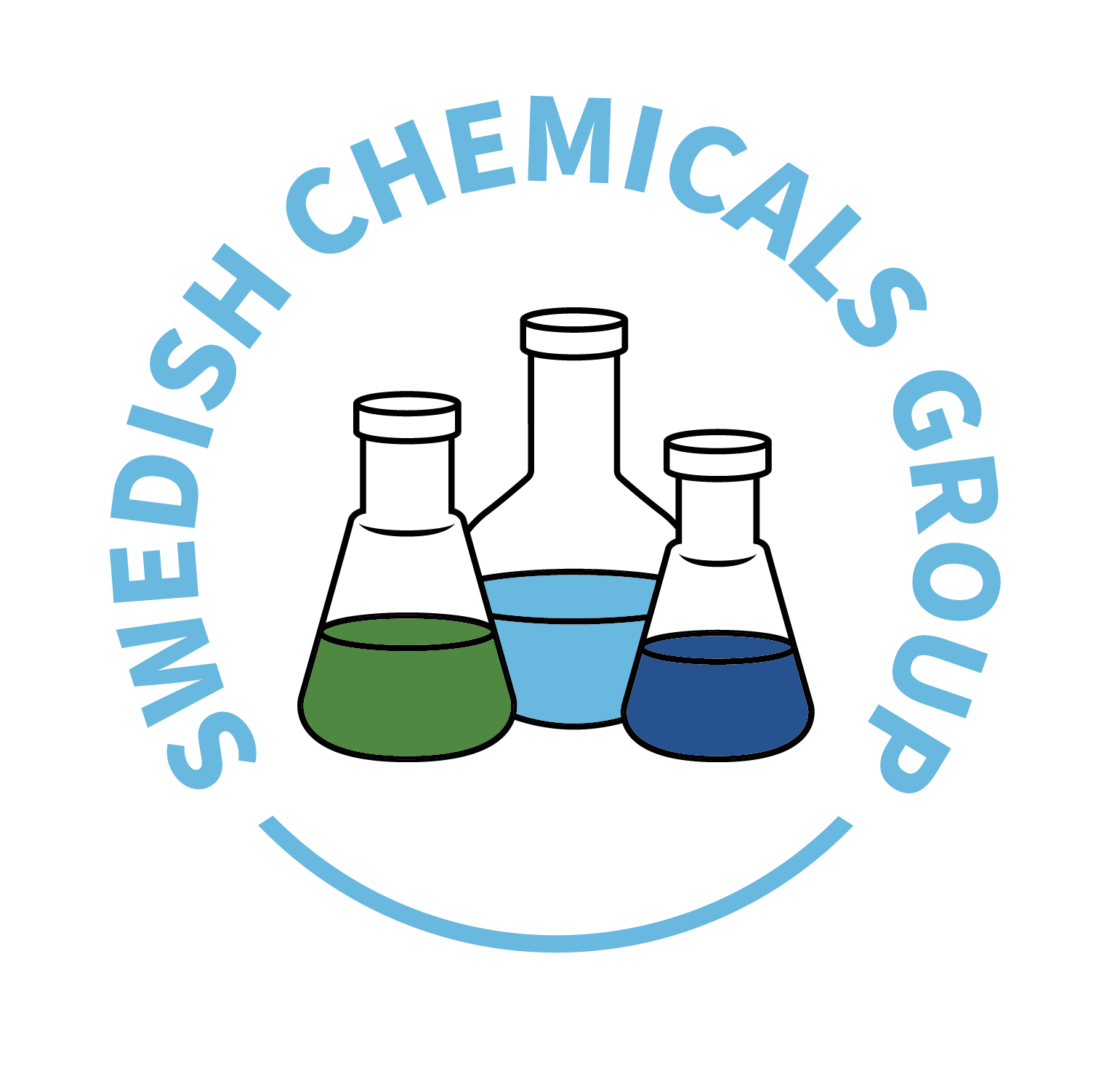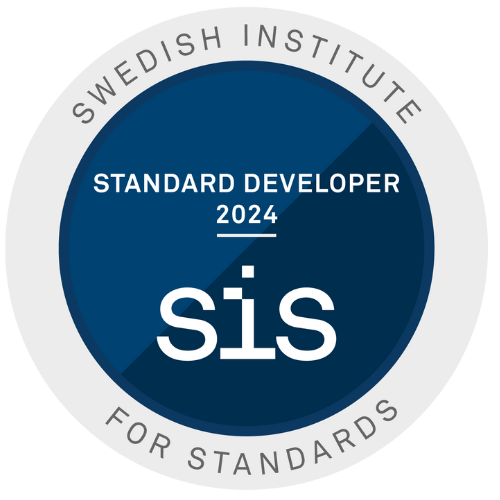
Certificates and product liability
We take responsibility for the high quality of our products by working with trusted certifications. This means that our products and our factories are independently audited. Find out more about our memberships and certifications in chemical management and sustainable materials below.
CHEMICALS
The Swedish Chemicals Group disseminates the latest information on chemical and environmental issues to member companies in the textile and electronics industry.
OEKO-TEX STANDARD 100 is one of the world's best-known labels for textiles tested for harmful substances and confirms the high level of product safety and customer confidence in textiles. The label is awarded to textile products that have been tested for harmful substances and found to be safe for human health.
SUSTAINABLE MATERIAL
GOTS which stands for Global Organic Textile Standard, is a widely recognized and respected certification for organic textiles. In a nutshell, GOTS sets the criteria and standards for the production, processing, and labeling of organic fibers, ensuring that textile products are made with environmental and social responsibility in mind.
Here are the key points about GOTS:
1. Organic Fiber Requirements: GOTS requires that textile products labeled as "organic" must contain a minimum percentage of certified organic fibers. This means that the raw materials used, such as cotton or wool, must be grown without the use of synthetic pesticides or genetically modified organisms (GMOs).
2. Environmental Criteria: GOTS has strict environmental standards that cover the entire textile production process. These include restrictions on the use of harmful chemicals and dyes, guidelines for waste management and energy consumption, and requirements for water treatment and conservation.
3. Social Criteria: GOTS also places importance on the social aspects of textile production. It requires compliance with international labor standards, ensuring fair and safe working conditions for the employees involved in the production process.
4. Traceability and Supply Chain Transparency: GOTS requires traceability throughout the entire supply chain. This means that from the raw material source to the final product, all stages of production must be certified, ensuring that the organic integrity is maintained and verified.
5. Labeling and Certification: Products that meet GOTS standards can carry the GOTS label, indicating their organic and sustainable credentials. To obtain this label, manufacturers and processors must undergo a comprehensive certification process, including inspections and compliance with GOTS criteria.
GOTS certification provides assurance to consumers that the textile products they purchase have been produced in an environmentally and socially responsible manner. It promotes sustainability, supports organic farming practices, and contributes to a more ethical and conscious textile industry.
OCS The Organic Content Standard is a certification standard that verifies and tracks the content of organically grown materials in products. OCS certification applies to various organic materials, including cotton.
Key points about OCS-certified cotton:
1. Organic Farming Practices: OCS-certified cotton is grown using organic farming practices. This means that it is cultivated without the use of synthetic pesticides, herbicides, or genetically modified organisms (GMOs). Instead, organic farmers rely on natural methods, such as crop rotation, biological pest control, and composting, to maintain soil fertility and control pests.
2. Environmental Benefits: OCS-certified cotton helps reduce the negative environmental impacts associated with conventional cotton production. By avoiding the use of synthetic chemicals, it minimizes soil and water contamination, reduces greenhouse gas emissions, and promotes biodiversity.
3. Quality and Safety: Organic cotton is known for its high quality and softness. OCS-certified cotton ensures that the cotton used in a product meets the required organic standards. It provides assurance to consumers that the cotton has been grown and processed without the use of harmful chemicals.
4. Supply Chain Transparency: OCS-certified cotton requires a transparent supply chain. It tracks the flow of organic materials from the farm to the final product, ensuring that the organic content is accurately identified and reported. This traceability helps consumers make informed choices and supports the integrity of organic claims.
5. Global Standard: The OCS is a global standard recognized and accepted by various stakeholders, including brands, manufacturers, and consumers. It provides a consistent framework for verifying and communicating the organic content of products, promoting transparency and trust in the marketplace.
It's important to note that OCS certification specifically focuses on the organic content of a product and does not cover other aspects of sustainability, such as labor practices, social responsibility, or water usage. Other certifications, such as the Global Organic Textile Standard (GOTS), may encompass a broader range of sustainability criteria.
When looking for OCS-certified cotton products, it's advisable to check for the OCS logo or certification information on the product label or consult the brand's website for details about their certification and sustainability practices.
GRS refers to the Global Recycling Standard. It is a certification system and standard that sets criteria for the processing, manufacturing, and labeling of recycled materials. The GRS aims to promote transparency, environmental responsibility, and social compliance in the recycling industry.
In a nutshell, the Global Recycling Standard:
1. Sets criteria: GRS establishes specific requirements for the content and origin of recycled materials, ensuring that they are sourced from responsible recycling practices.
2. Promotes traceability: GRS emphasizes traceability throughout the supply chain, from the collection of recycled materials to their final use, to verify their authenticity and sustainability.
3. Encourages environmental considerations: The standard encourages the reduction of environmental impact during the recycling process, including energy consumption, water usage, and the handling of chemicals.
4. Addresses social compliance: GRS includes provisions to ensure that workers involved in the recycling process are treated fairly, with respect for labor rights and safe working conditions.
5. Enables labeling and communication: GRS allows products made from recycled materials to carry the GRS logo or label, providing consumers with confidence that the product meets certain environmental and social standards.
In summary, the Global Recycling Standard (GRS) is a certification system that promotes responsible recycling practices, transparency, and sustainable use of recycled materials in various industries.
Fairtrade cotton is a certification system that aims to promote fair and sustainable practices in the cotton industry. It is designed to ensure that cotton farmers receive fair prices for their crops and work under safe and humane conditions. While Fairtrade cotton is not inherently "better" than conventional cotton, it offers certain advantages and benefits.
1. Fair prices: Fairtrade guarantees a minimum price for cotton, which helps farmers earn a sustainable income and support their families. This stability can improve their living conditions and provide access to education, healthcare, and other essential services.
2. Fair labor conditions: Fairtrade standards prohibit forced labor, child labor, and unsafe working conditions. They promote fair wages, reasonable working hours, and the right to freedom of association for cotton workers. By choosing Fairtrade cotton, consumers can support ethical and responsible practices in the industry.
3. Environmental sustainability: While Fairtrade primarily focuses on social aspects, it also encourages environmentally sustainable practices. Fairtrade-certified cotton farmers must follow certain guidelines regarding pesticide use, water management, and soil conservation. However, it's worth noting that Fairtrade does not have the same level of environmental criteria as organic certifications.
4. Community development: Fairtrade premiums are additional funds that are paid to farmers' cooperatives or communities. These premiums can be invested in various social and economic development projects, such as education, healthcare, infrastructure, or agricultural improvements. This contributes to the overall well-being of cotton-growing communities.
5. Transparency and traceability: Fairtrade certification ensure a transparent supply chain by requiring rigorous auditing and documentation. This helps consumers trace the origin of the cotton and verify that it was produced under Fairtrade standards.
It's important to note that Fairtrade is just one certification among many in the market, and it has its limitations. Some critics argue that it may not go far enough to address systemic issues in the cotton industry, such as environmental impact or market access for small-scale farmers. However, supporting Fairtrade cotton is a positive step towards more ethical and sustainable cotton production.
QUALITY AND ENVIRONMENTAL WORK
SIS (Swedish Institute for Standards) Technical Committee (TC) 397 Footwear monitors European and international standardization work in the field of protective footwear and leg protection, as well as work at national level. This work is handled separately as the committee is divided into two working groups, AG 01 Protective footwear and G 02 Consumer footwear.
ISO 14001: Environmental Management System (EMS) is a globally accepted standard for establishing an environmental management system (EMS). It provides organizations with a structured framework for identifying, managing and minimizing the environmental impacts of their activities, products and services. ISO 14001 emphasizes commitment to sustainable practices, legal compliance, pollution prevention, resource efficiency and continual environmental improvement. By implementing ISO 14001, organizations can demonstrate their commitment to environmental responsibility, reduce their ecological footprint and engage stakeholders in their environmental efforts.
ISO 9001: Quality management system (QMS) is an internationally recognized standard that establishes the framework for a quality management system (QMS). It describes principles and practices that organizations can follow to consistently provide products and services that meet customer and regulatory requirements. ISO 9001 focuses on processes, customer satisfaction, continual improvement and decision-making based on evidence. By implementing ISO 9001, organizations can improve their efficiency and overall quality, leading to increased customer satisfaction and long-term success.

SHARELABEL
All products from our brand South West are marked with a QR code to make it easy for the user to get information about the garment's sustainable production and materials. In addition, you will get tips and maintenance advice on how to extend the life of the garment.
We are working to get more information about the garment's CO2 emissions, as well as where and how it can be recycled. This work is also ongoing at our other brands such as Top Swede and Matterhorn.





